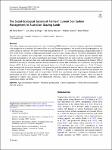Thông tin tài liệu
Thông tin siêu dữ liệu biểu ghi
| Trường DC | Giá trị | Ngôn ngữ |
|---|---|---|
| dc.contributor.author | Amin, Md Nurul | - |
| dc.contributor.author | Bruyn, Lisa Lobry de | - |
| dc.contributor.author | Hossain, Md Sarwar | - |
| dc.date.accessioned | 2023-08-09T01:55:43Z | - |
| dc.date.available | 2023-08-09T01:55:43Z | - |
| dc.date.issued | 2023 | - |
| dc.identifier.uri | https://link.springer.com/article/10.1007/s00267-023-01801-4 | - |
| dc.identifier.uri | https://dlib.phenikaa-uni.edu.vn/handle/PNK/8744 | - |
| dc.description | CC-BY | vi |
| dc.description.abstract | Soil carbon sequestration programmes are a way of offsetting GHG emissions, however, it requires agricultural landholders to be engaged in such initiatives for carbon offsets to occur. Farmer engagement is low in market-based programmes for soil carbon credits in Australia. We interviewed long-term practitioners (n = 25) of rotational grazing in high-rainfall lands of New South Wales, Australia to understand their current social-ecological system (SES) of soil carbon management (SCM). The aim was to identify those components of the SES that motivate them to manage soil carbon and also influence their potential engagement in soil carbon sequestration programmes. | vi |
| dc.language.iso | en | vi |
| dc.publisher | Springer | vi |
| dc.subject | SES | vi |
| dc.subject | SCM | vi |
| dc.title | The Social-Ecological System of Farmers’ Current Soil Carbon Management in Australian Grazing Lands | vi |
| dc.type | Book | vi |
| Bộ sưu tập | ||
| OER - Khoa học môi trường | ||
Danh sách tệp tin đính kèm:

